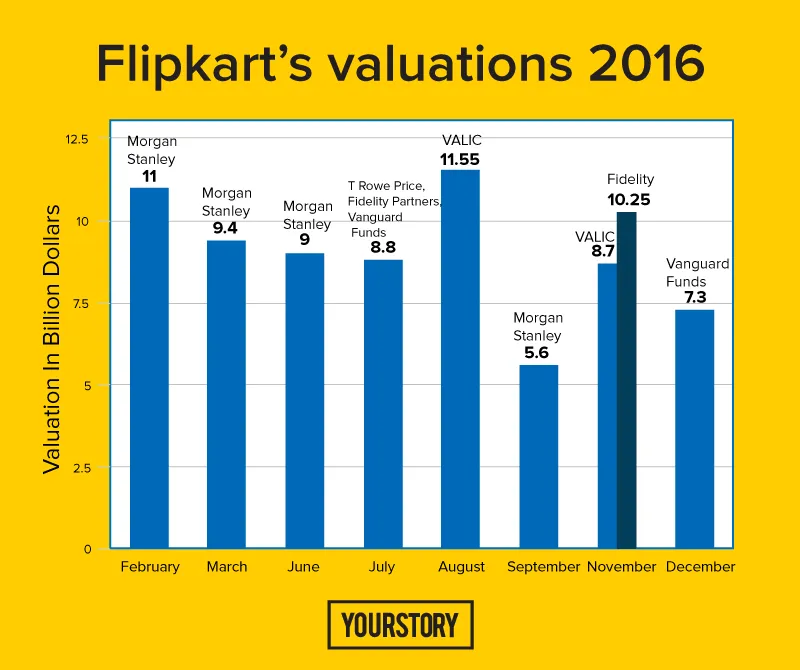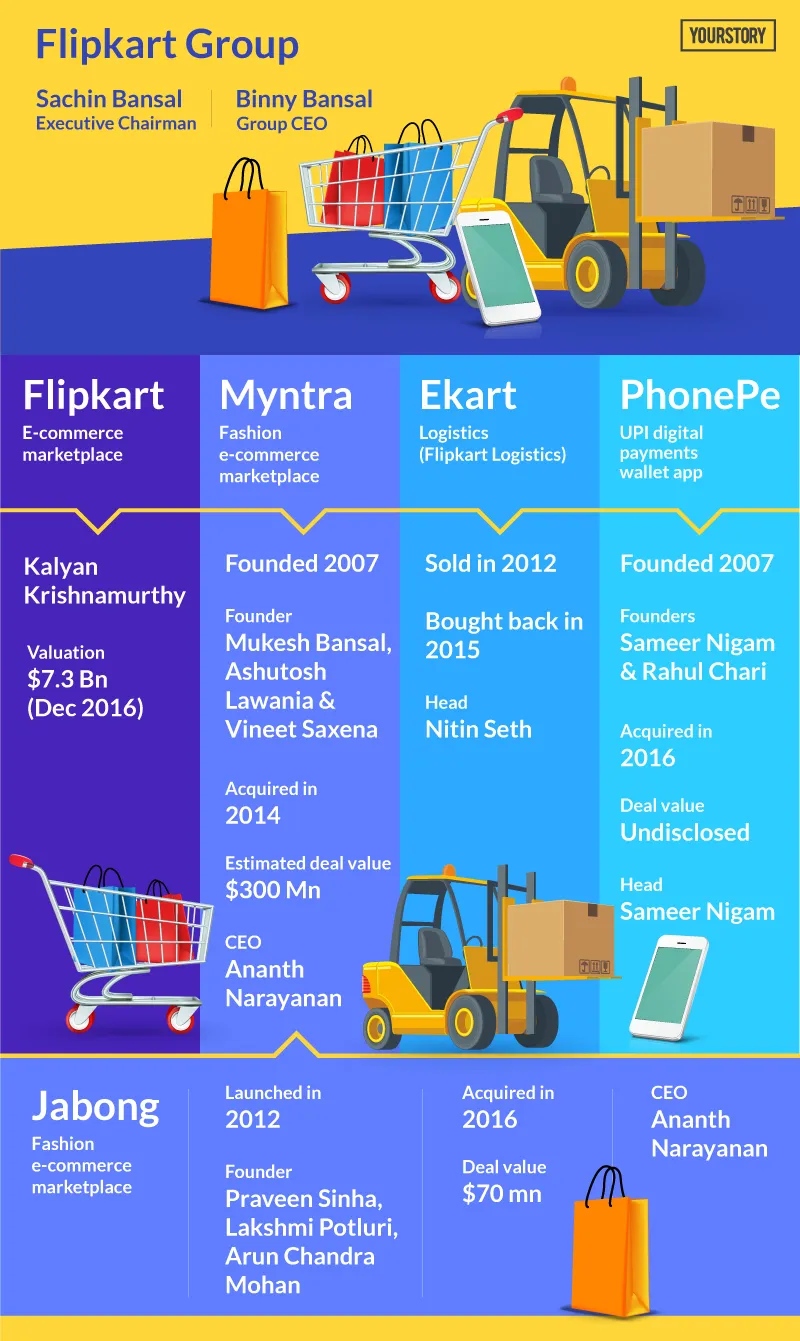Why Kalyan Krishnamurthy may be the best thing to happen to Flipkart: Lessons from Alibaba
YourStory finds out from sources close to Flipkart why Kalyan Krishnamurthy could be the best option for Flipkart as the first non-founder CEO of an Indian startup Unicorn.

In 2001, when Alibaba was still a startup struggling with the nascent internet revolution, Founder Jack Ma had to fire their Silicon Valley team due to a financial crunch – one of the most painful decisions he had to take. Although “Alibaba doesn’t plan” was Jack Ma’s proud statement about the company he founded in the late 90s, the 100-odd-member team working out of China was in dire need of a plan.
Enter Savio Kwan - a management veteran who had spent more than a decade at GE - as COO. The first thing he did was to cut the majority of Alibaba’s international staff. For the first time in Alibaba’s history, he ensured that there were quarterly reviews and scorecards that judged the workforce on not just performance, but also on adhering to Alibaba’s core values.
Porter Erisman, former vice president of Alibaba, writes in his memoir, Alibaba’s World, how he was skeptical about Kwan at first, but was soon convinced that he was exactly the COO Alibaba needed. “Savio provided an exoskeleton – outer constraints that helped keep the company from growing out of control. His emphasis on codifying Alibaba’s values proved to be the critical formula that allowed the company to grow larger while maintaining its startup spirit and strong team culture.”
In 2003, Li Qi took charge of Alibaba’s international business and became COO two years later. Erisman recollects: “With firmness and decisiveness, Liqi had built up Alibaba’s national sales force, a key factor in its reaching profitability. A street-smart, no-nonsense manager, he was a perfect counterweight to Jack. If Jack was a budding Bill Gates, Liqi was his Steve Ballmer.”
This was the reality in another country in another decade.
Fast forward to India 2017. Flipkart is (almost) to India what Alibaba is to China, at least in e-commerce. They have put up a good fight against Amazon. But in 2016, Sachin Bansal and Binny Bansal’s brainchild fell from a $15 billion valuation to $5 billion after multiple markdowns by investors (see graph below). Although they were funded with more than $3 billion, Flipkart’s monthly losses were only going higher.

Exactly a year ago, Sachin stepped down from the top job to take up the role of executive chairman, while Binny replaced him as CEO. Then there was an exodus of high profile recruits. Amidst this stormy weather, some of Flipkart’s old hands came back – among them, Kalyan Krishnamurthy, a senior executive from Flipkart’s largest investor, Tiger Global, who was interim CFO at the e-commerce giant in 2013-14.
Evoking an Alibaba-like déjà vu, Kalyan’s entry as head of category design was soon followed by him becoming in charge of marketplace and commerce as well. Like Kwan did for Alibaba, Kalyan (as soon as he joined Flipkart in June 2016), tightened the targets and fired quite a few senior executives for poor performance - a move that apparently succeeded in ensuring that nobody remained laid back anymore.
It soon became obvious that something big was brewing at Flipkart. On Monday, January 9, 2017, without even the employees being notified beforehand, Kalyan was declared Flipkart CEO, while Binny became Flipkart Group CEO.
Many industry experts were expecting this. Organisational rebuilding was essential in Flipkart, they say, and Kalyan is a financial controller, experienced and credible. Although talks were going on, even the senior officials were uncertain on when it would happen.
YourStory finds out from sources close to Flipkart why Kalyan could be the best option for the company, as the first non-founder CEO of an Indian startup Unicorn.
Kalyan Savio-LiQi Krishnamurthy
Although 10 members of the top brass exited Flipkart in 2016, there was more chaos inside than met the public eye. An ex-employee told YourStory, “Many senior officials have left Flipkart’s tech team on their own due to the instability there. At one point in 2015, a whole floor was empty.”
In 2016, although their famed Big Billion Days sale ensured that Flipkart had an upper hand over Amazon, it was not enough to spark a faster pace of growth for the company, which was trying to raise funding again at a high valuation. The high attrition rate was not helping the company’s image either.
But like Kwan and Li Qi from another era, Kalyan is a serious, straightforward, non-controversial person. Decisions had to be made, even though some were hard.
That is one advantage of being a non-founder CEO. A senior employee in Flipkart Group says,
“When you are a CEO and not a founder, you can take decisions dispassionately. There are fewer sentiments. Flipkart has top talent, but the challenge is to get them to move forward with the company.”
An ex-employee, who has worked with Kalyan and Binny, agrees that Kalyan is a good option for Flipkart at this juncture, although there is talk that Tiger Global is tightening its grip on Flipkart with Kalyan, their right-hand man. “I feel it is a good move for Flipkart. In my past work engagements with Kalyan, I have found him to be a good leader and mentor. He has a lot of experience in the e-commerce industry. He knows the business, including the financial side of it. He is more of an experienced professional than an investor for Flipkart,” said this person, on condition of anonymity.
Kalyan clearly seems to have won the team over. “Kalyan is open minded and brilliant in execution. He leads by example,” says a Flipkart employee. Even former employees remember Kalyan as quite an inspiring person. “Kalyan encourages people to experiment. I recollect that when people went to him with ideas, he would always tell them to experiment and come back with results. It is quite motivating,” says another former employee.

Trying times for Flipkart
Talks of a tie-up with Walmart have died down, but Flipkart needs to raise a large amount of money in funding. “A new CEO is a signal to potential investors – that Flipkart will fight it out with Amazon, and that inside the organisation too, performance matters. The next three months are crucial to raise money. The Flipkart Group now has 15-16 months’ cash left to run with. Of course, if they had money to last for less than a year, conditions would be different. They will not fret too much about valuations,” says the senior executive mentioned earlier.
Flipkart, after all, has too many functions for one person to take care of. Although Chief Administrative Officer Nitin Seth has taken over as COO, his plans have not been revealed yet. The Flipkart Group, which Binny is to head, seems to be a conglomeration of Flipkart, Myntra, Jabong, PhonePe and Ekart. But the senior officials YourStory spoke with say that they will be opening up a couple of new ventures soon.
Despite the critical views on protectionism that Sachin (in)famously argued for recently, Indian startups do want a Flipkart victory. A prominent e-commerce startup founder tells YourStory,
“Flipkart deserves to succeed; it is important for the Indian startup ecosystem. They are the bell ringer of e-commerce. They should be given a chance to prove themselves. As long as Sachin and Binny are at Flipkart in the capacity of Group CEO and Executive Chairman, they are still part of the decision-making process that goes into building their products. They might be in a larger role under those designations.”
With a restructuring of this scale, office politics is almost inevitable. But Flipkart could be lucky. In his earlier stint with the company, Kalyan was in charge of categories before becoming CFO, and launched the Big Billion Day sale while Binny was heading Ekart. “Binny and Kalyan have great chemistry. There was great synergy between the two, considering the scale of the operations (during the first BBD sale in 2014),” says one source.
This is the time for Flipkart’s top leadership to stand together. Profitability cannot wait anymore; an IPO cannot be pushed farther. It would be a boost to the Indian startup ecosystem in general if the ‘Flipsters’ (as Flipkart employees call themselves) pull it off despite changes in designations, and gain stability. Indian startup history would remember and look up to Kalyan as the man at the helm if and when it finally happens.
Coming back to Alibaba – they claimed the largest IPO in history in 2014, and Jack Ma remains one of the most inspiring entrepreneurs the world has ever seen. But Jack Ma is now Alibaba Chairman, not CEO. Will Kalyan be Savio Kwan to Sachin’s Jack Ma, Steve Ballmer to Binny’s Bill Gates? Only time will tell.
(Image credits - Gokul K; Infographics by Aditya Ranade)







